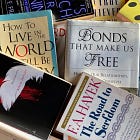Man's Search for Meaning Session 1: What Stops Us From Taking Responsibility
We are simultaneously experiencing two contradictory attractions.
Welcome back to the next set of sessions of Mindset Shifts U; the university where we are all students, teachers, and, most importantly, learners.
We will work through Man’s Search for Meaning thematically, not linearly.
Psychologist David K. Reynolds, whose work we will study in a future session at Mindset Shifts U, writes, “No one else controls you. Your responsibility, your control, lies only in the sphere of your own behavior. What results is up to you and reality. Being in charge of yourself is a full-time job.”
From Meditations, we know that Marcus Aurelius often chided himself for vacating his command center, the decision-making part of his mind.
How often do we claim to exercise our freedom while avoiding responsibility and blaming others and circumstances for our actions? Like Aurelius, Frankl is having none of this.
Near the end of Man’s Search for Meaning, Viktor Frankl writes,
Freedom, however, is not the last word. Freedom is only part of the story and half of the truth. Freedom is but the negative aspect of the whole phenomenon whose positive aspect is responsibleness. In fact, freedom is in danger of degenerating into mere arbitrariness unless it is lived in terms of responsibleness. That is why I recommend that the Statue of Liberty on the East Coast be supplemented by a Statue of Responsibility on the West Coast.
As we begin our study of Man’s Search for Meaning, we can wonder why taking responsibility is a major theme in the work of Aurelius, Frankl, and Reynolds. Shouldn’t it be obvious that we are in charge of ourselves?
Often it is not. Responsibility is also a constant theme in Stephen Covey’s perennial bestseller The 7 Habits of Highly Effective People. Frankl heavily influenced Covey who writes,
Look at the word responsibility—“response-ability”—the ability to choose your response. Highly proactive people recognize that responsibility. They do not blame circumstances, conditions, or conditioning for their behavior. Their behavior is a product of their own conscious choice, based on values, rather than a product of their conditions, based on feeling.
Understanding our values is essential in making the most of Man’s Search for Meaning. Since our values are central to making meaning, we will cover values in a separate weekly session.
Covey continued, “Because we are, by nature, proactive, if our lives are a function of conditioning and conditions, it is because we have, by conscious decision or by default, chosen to empower those things to control us.”
This is a crucial point—we choose to have the objects of our blame control us.
When we make that choice, Covey writes, “we become reactive.” He continues with this example,
Reactive people are often affected by their physical environment. If the weather is good, they feel good. If it isn’t, it affects their attitude and their performance. Proactive people can carry their own weather with them. Whether it rains or shines makes no difference to them. They are value driven; and if their value is to produce good quality work, it isn’t a function of whether the weather is conducive to it or not.
The willingness to relinquish our personal, long-standing patterns of thought and behavior to regain our power of choice does not come easily. If it were easy, we would have completed our process of change after reading the first few notebooks of Meditations. If it came easily, I would not be on my fifth reading of Man’s Search for Meaning.
It doesn’t come easily because we are simultaneously experiencing two contradictory attractions.
Keep reading with a 7-day free trial
Subscribe to Mindset Shifts—Essays by Barry Brownstein to keep reading this post and get 7 days of free access to the full post archives.

